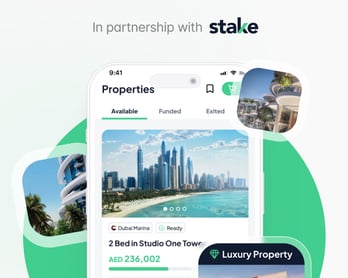Passive investments are rising in popularity. According to CNBC, assets in this category recently hit $133 billion, up from $27 billion before the pandemic. Morningstar states that passive investments now hold more than 50% of investment assets.
So what makes these investment vehicles so appealing? How are they different? How do they work? What does the future hold for real estate in this investment class?
Explore our real estate offerings
What is passive investing?
Passive investing is a top-down investment approach that aims to capitalize on opportunities created by long-term, predictable trends. This macroeconomic method "sees the forest for the trees," by focusing on the big picture of a market, rather than micro-level factors that tend to change rapidly.
By going long across a particular sector or market cross-section, passive investing strategies minimize buying and selling. This saves on both transaction costs and active management fees, which can eat a significant chunk of returns. Instead of trading specific securities to catch quickly-moving market trends, passive investors stay in for the long haul, usually using investment vehicles that diversify across particular geographies, industries, or asset classes.
As of mid-2021, passive investments are all the rage. Much of their success comes from the ETF industry, which currently has more than 6,000 ETFs listed on the market. Their popularity largely comes from their unique characteristics that offer strategy-based allocations in specific sectors, geographies, and trends.
A case for the future of passive real estate investing
Real estate investors have yet to adopt these popular strategies. Why? It's simple: the products just haven’t been created yet.
Most real estate investment vehicles are based on actively finding specific properties that the managers believe can generate returns. We've yet to see real estate investment products that apply a passive investment strategy across a specific geography or sector, letting long-term trends do the work.
Our belief is that if it can happen in other markets, it can happen in real estate as well. To that end, factors like enhanced transparency and evaluation will likely lead to the same result as other asset classes.
To analyze this, we need to start with a benchmark. Green Street’s Commercial Property Return Index is a time series of unleveraged U.S. commercial property income and values using over $600 billion of institutional quality real estate assets.
For comparison, we need to look at the returns for active managers in the category. In this example, we will use the NCREIF Property Index—the leading provider of investment performance indices and transparent data for US commercial properties.
The chart below shows how active managers stack up against the benchmark over the last 10 years:
Year |
Green Street CPPI (Benchmark) |
NCREIF Property Index (Active) |
Active Mgmt. Alpha |
2011 |
15.3% |
14.3% |
-1.0% |
2012 |
10.9% |
10.5% |
-0.3% |
2013 |
11.8% |
11.0% |
-0.8% |
2014 |
17.1% |
11.8% |
-5.3% |
2015 |
10.7% |
13.3% |
2.6% |
2016 |
7.3% |
8.0% |
0.6% |
2017 |
5.3% |
7.0% |
1.7% |
2018 |
6.5% |
6.7% |
0.2% |
2019 |
6.6% |
6.4% |
-0..2% |
2020 |
-3.2% |
1.6% |
4.8% |
Avg. |
8.8% |
9.1% |
0.3% |
As you can see, the returns are virtually the same, which begs the question: Is active management worth the cost?
The benefits of passive real estate investing
The benefits for passive real estate investing are much like those of the asset classes that migrated before them—and flourished. It stands to reason that if it worked for equities, fixed income, and commodities, why can’t it also work for real estate?
Why we believe this could be good for investors:
Fees will come down: Asset managers in real estate typically charge a “promote” or carried interest. They "earn" based on their ability to source, acquire, and manage specific assets, similar to what portfolio managers use to market their services. A passive strategy will drastically lower these fees.
Net returns will go up: These extra fees can easily take up 20%-30% of total investor returns (with investors bearing all the risk, without all the reward). Passive investing will preserve more capital in investors’ accounts.
More liquidity: Passively managed investments are open-ended, which allows investors to participate in their desired category with flexibility regarding how and when they purchase shares. We believe they will eventually become tradable products on an exchange.
More transparency: The investments will provide portfolio level, property level, and market data on a real-time basis.
We believe the future of passive investing in real estate is bright, and will soon provide new ways for anyone to invest in hard-to-reach, burgeoning real estate markets. This could be a game changer for people who simply don’t have the upfront cash to buy a property on their own, and an accelerator to building personal wealth.
Explore our real estate offerings
This educational article is provided by Republic to help its users understand this area of the market, it should not be construed as investment advice as it is impersonal, disinterested and was produced by Republic for Republic’s users, without remuneration received or expected.



 Oops! We couldn’t find any results...
Oops! We couldn’t find any results...







